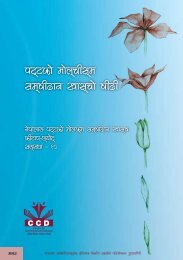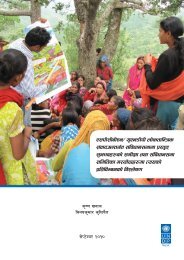English - Support to Participatory Constitution Building in Nepal ...
English - Support to Participatory Constitution Building in Nepal ...
English - Support to Participatory Constitution Building in Nepal ...
You also want an ePaper? Increase the reach of your titles
YUMPU automatically turns print PDFs into web optimized ePapers that Google loves.
Contradiction and dualityIt is believed that the dynamic <strong>in</strong>terplay of unified opposites results <strong>in</strong>ongo<strong>in</strong>g and <strong>in</strong>evitable change for relationship partners. Maoists, s<strong>in</strong>ceseveral years, have been able <strong>to</strong> play with contradictions among thema<strong>in</strong>stream parliamentary parties (ma<strong>in</strong>ly <strong>Nepal</strong>i Congress and UML) byrespond<strong>in</strong>g positively <strong>to</strong> one at the cost of negat<strong>in</strong>g the other temporarilyand vice versa. Play<strong>in</strong>g dual role, the parties were successful <strong>in</strong> negat<strong>in</strong>gone at the cost of the other and switch<strong>in</strong>g back and forth at other times.This resulted <strong>in</strong> changed relations among powerful parties <strong>in</strong> a dramaticway with ups and downs lead<strong>in</strong>g ultimately <strong>to</strong> the government changesat several occasions dur<strong>in</strong>g the decade long armed conflict <strong>in</strong> <strong>Nepal</strong>.Maoists were even us<strong>in</strong>g <strong>in</strong>tra-party contradictions <strong>to</strong> replace one leaderby another with<strong>in</strong> the govern<strong>in</strong>g party (example of the formation ofDeuba-led government by replac<strong>in</strong>g his own party leader- G.P. Koirala)as party leaders were try<strong>in</strong>g <strong>to</strong> use Maoists as a <strong>to</strong>ol <strong>to</strong> change powerstructure with<strong>in</strong> the party. Maoists were able <strong>to</strong> use such moments andchanges <strong>in</strong> their favour as well as negotiate with the parties. However,they were not effective <strong>in</strong> try<strong>in</strong>g <strong>to</strong> persuade parties for radical changesdue <strong>to</strong> powerful presence and ownership of the Monarchy over the statemach<strong>in</strong>ery (particularly the army) and overall decision mak<strong>in</strong>g (exampleof three failed peace talks over the issue of election <strong>to</strong> the CA). At somepo<strong>in</strong>ts, play<strong>in</strong>g with such contradictions was useful <strong>to</strong> br<strong>in</strong>g changes <strong>in</strong> therelationships lead<strong>in</strong>g <strong>to</strong> peaceful negotiation (results of the Twelve Po<strong>in</strong>tUnderstand<strong>in</strong>g between the Seven Party Alliance and Maoists <strong>in</strong> 2005).This game of play<strong>in</strong>g with contradictions and consensus based politicalnegotiations <strong>in</strong> deal<strong>in</strong>g with contradictions ended after the results ofelection <strong>to</strong> the CA <strong>in</strong> April 2008 <strong>in</strong> general (where the Maoists emerged asthe largest party with 40% seats <strong>in</strong> the CA) and election of the President(Maoists los<strong>in</strong>g <strong>to</strong> comb<strong>in</strong>ed opposition candidate) by the CA <strong>in</strong> particular.The <strong>Nepal</strong>i Congress and CPN (UML) were badly defeated with theirsenior leaders los<strong>in</strong>g the election. Follow<strong>in</strong>g the defeat <strong>in</strong> the election <strong>to</strong>the CA, the <strong>Nepal</strong>i Congress government led by G.P. Koirala reluctantlyhanded over the power <strong>to</strong> the Maoists after four months (<strong>in</strong> July 2008)of political maneuver<strong>in</strong>g and only after Maoists agree<strong>in</strong>g <strong>to</strong> amend theInterim <strong>Constitution</strong> <strong>to</strong> replace consensus politics (2/3 majority) by simplemajority government provision. This was a turn<strong>in</strong>g po<strong>in</strong>t <strong>in</strong> the <strong>Nepal</strong>ipeace process where the parties f<strong>in</strong>ally ended the consensus-basedpolitical culture developed after Twelve Po<strong>in</strong>t Understand<strong>in</strong>g <strong>in</strong> 2005.Despite general consideration that contradictions <strong>in</strong> <strong>Nepal</strong>i society orpolitical front have been transform<strong>in</strong>g, it does not happen au<strong>to</strong>matically.In some cases, contradictions also result <strong>in</strong> disabl<strong>in</strong>g progress <strong>to</strong>wards294


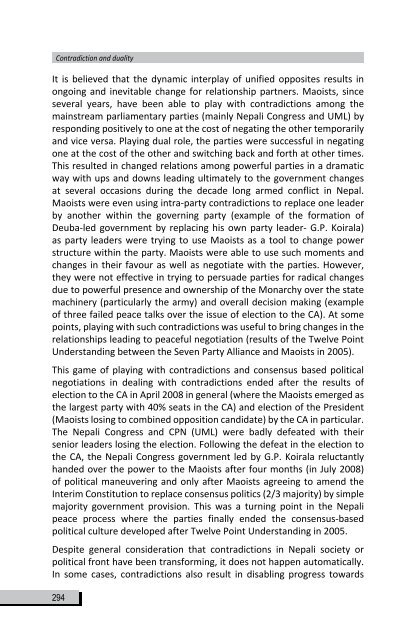

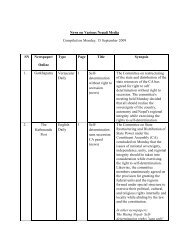
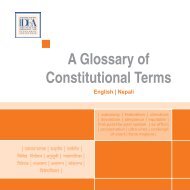
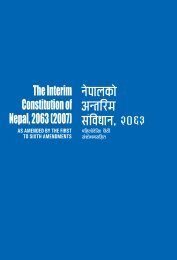
![g]k fnsf blntx? / gofF ;+l jwfg](https://img.yumpu.com/49483602/1/184x260/gk-fnsf-blntx-goff-l-jwfg.jpg?quality=85)
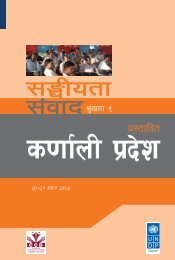
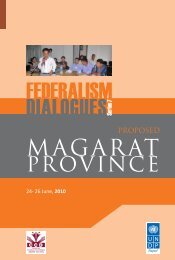
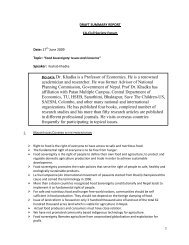
![+ljwfg;ef, /fHosf]k'g](https://img.yumpu.com/41604075/1/184x260/-ljwfgef-fhosfkg.jpg?quality=85)
